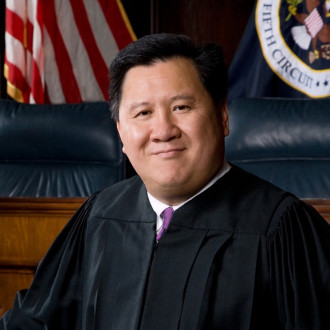Trump judicial appointee's footnote gets noticed for his stand against homophobic arguments

Judge James Ho. Photo from the 5th U.S. Circuit Court of Appeals.
A Trump judicial appointee on the 5th U.S. Circuit Court of Appeals at New Orleans is getting noticed for a footnote in which he took a stand against homophobic legal arguments.
The judge, James Ho, wrote in a footnote that a lawyer’s arguments about a teacher “appear to appeal to prejudice,” the Texas Lawyer reports.
Ho was previously in the news for his strong support of police officers in qualified immunity cases involving allegations of excessive force. Twitter users expressed surprise in the footnote in the new opinion by the appeals court, according to the Texas Lawyer story.
In the new case, a parent sued a school official in Hinds County, Mississippi, for allegedly violating her 12-year-old son’s Fourth Amendment rights by searching his pockets after he was caught selling contraband candy.
The mother at first alleged that the official grabbed her son’s genitalia, which led a judge to deny the official qualified immunity, the 5th Circuit said. But evidence later showed that the official searched the youth’s pockets but did not grab his genitalia, and the official was granted qualified immunity.
On appeal, the mother said her argument had been misunderstood, and she was complaining only about an unreasonable search, not a genitalia grab. “But accepting her contention as true,” Ho wrote in the Feb. 7 opinion, “it only means that the district court should have granted qualified immunity to [the official] even earlier.” The 5th Circuit tossed the appeal.
In a footnote that wasn’t joined by other judges on the panel, Ho said he would have directed the parent’s lawyer to explain why she shouldn’t be sanctioned for filing a frivolous appeal.
The lawyer’s briefs “not only contain countless misspellings and grammatical errors—they also appear to appeal to prejudice,” Ho wrote in the footnote.
The lawyer’s opening brief contended that the official was “touching around” in the student’s pocket, leading the student to think that the school official was gay.
The student thought that the official was gay, “making the touch of the minor’s privacy area that more offensive,” the lawyer’s brief said.
Ho said that was “circular logic.”
“And the demonstrable failure of counsel’s logic makes one wonder why counsel bothers to bring up sexual orientation at all,” Ho wrote in the footnote. “It should go without saying that members of the bar are expected to engage in legal argument—not prejudice.”
Write a letter to the editor, share a story tip or update, or report an error.


